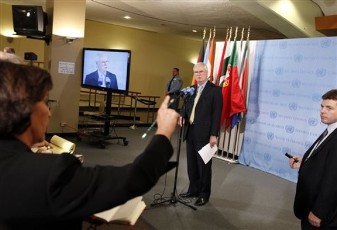UNSC condemns attempts to overthrow governments in Khartoum & Juba
March 6, 2012 (WASHINGTON) – The United Nations Security Council (UNSC) on Tuesday issued a presidential statement demanding an end to the fighting on the borders of Sudan and South Sudan and for the two countries to honour the non-aggression pact they signed last month.

In particular, Khartoum claims that Juba is sponsoring fighters from the Sudan People’s Liberation Movement North (SPLM-N) who are fighting Sudan Armed Forces (SAF) in South Kordofan and Blue Nile. They further allege that the south was the mastermind behind the Sudan Revolutionary Front (SRF) which is an umbrella group that incorporates SPLM-N and Darfur rebel groups.
“The Security Council demands that all parties cease military operations in the border areas and put an end to the cycle of violence. It further demands that the Governments of Sudan and South Sudan take no action that would undermine the security and stability of the other, including through any direct or indirect form of support to armed groups in the other’s territory” the UNSC said in a statement read by Britain’s UN ambassador Mark Lyall Grant, security council president for March.
“The Security Council condemns actions by any armed group aimed at the forced overthrow of the Government of either Sudan or South Sudan. The Security Council affirms its strong commitment to the sovereignty and territorial integrity of both Sudan and South Sudan”.
The rare show of unity by UNSC on north-south conflict is likely to put pressure on the two governments amid growing tensions which observers fear could ignite a return to war.
The council also urged Khartoum and SPLM-N to return to negotiating table for talks on ending the war in Blue Nile and South Kordofan on the basis of the June 2011 accord signed between the two sides in Addis Ababa.
Sudanese president Omer Hassan al-Bashir scrapped the deal, which addressed the South Kordofan situation, signed by his aide and instructed the army to push forward with military operations. Bashir’s move was a huge setback to the African Union (AU) mediation team led by former South African president Thabo Mbeki.
“The Security Council recalls the 28 June 2011 Framework Agreement between the Government of Sudan and the Sudan People’s Liberation Movement-North (SPLM-N) on political and security arrangements for Blue Nile and Southern Kordofan states, and urges them to return to direct talks to resolve all political and security issues on the basis of the Comprehensive Peace Agreement and of the agreed principles of the Framework Agreement. The Security Council urges them to resolve the underlying issues that have fuelled the current conflict in Southern Kordofan and Blue Nile, to end all violence, and to agree to an immediate cessation of hostilities”.
The United Nations High Commissioner for Refugees (UNHCR) says that tens of thousands of civilians have fled the fighting into neighbouring countries.
Sudan has refused to allow aid groups into the states and insisted that the humanitarian situation there is stable despite UN and international assertions to the contrary and US warnings of a famine.
“The Security Council emphasizes the grave urgency of delivering humanitarian aid to avert a worsening of the serious crisis in Southern Kordofan and Blue Nile, and demands that the Government of Sudan and the SPLM-N cooperate fully with the United Nations and other humanitarian agencies and organizations, and ensure, in accordance with international law, including applicable international humanitarian law, and guiding principles of emergency humanitarian assistance, the safe, unhindered and immediate access of United Nations and other humanitarian personnel, as well as the delivery of supplies and equipment, in order to allow such personnel to efficiently perform their task of assisting conflict-affected civilian populations in Southern Kordofan and Blue Nile states”.
Khartoum and Juba’s envoys at the UN defended their respective positions.
“We have not started a war. Nonetheless, we were pushed into this. We were forced into this,” Sudan’s UN ambassador Daff-Alla Elhag Ali Osman told the council.
Later he told reporters: “We will do our utmost best to chase any aggressor who steps inside our territory”.
South Sudan’s envoy, David Buom Choat, said his country had been “unfairly accused” of interfering in the conflict between rebels and the government on the northern side of the border.
(ST)
